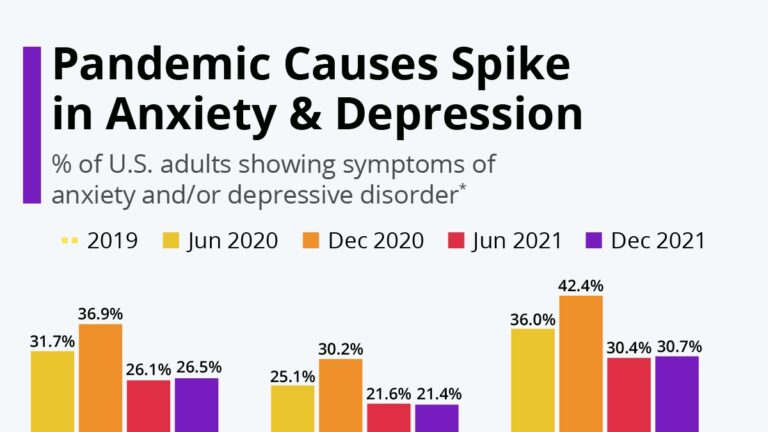The impact of the COVID-19 pandemic on mental health
The COVID-19 pandemic has profoundly affected various aspects of life, with mental health being a major concern, particularly among young adults. Pandemic-induced stressors, such as social isolation, economic uncertainty, and disruption of routines, have led to a sharp increase in anxiety and depression. Growing evidence highlights the severity of this mental health crisis and highlights the need for targeted interventions.
Increased anxiety and depression in patients with chronic illnesses
Research conducted in Amman, Jordan, found a high prevalence of anxiety and depressive symptoms among patients with chronic illnesses in the post-pandemic period. The study found a 25% increase in the prevalence of anxiety and depression during the pandemic, with most participants reporting significant levels of borderline abnormal or mild anxiety. Furthermore, quality of life in terms of physical and emotional role domains was found to be relatively poor in these patients. These results indicate the adverse impact of the pandemic on the mental health of patients with comorbidities.
Mental health issues and the pandemic: a scoping review
An exploratory review of studies conducted during the first year of the COVID-19 pandemic found that people with pre-existing symptoms of depression, anxiety, and stress-related disorders experienced exacerbated mental health problems due to of the pandemic. The analysis found that depression was the most commonly reported pre-existing disorder, followed closely by anxiety. This calls for enhanced mental health supports during the pandemic and highlights future research needs, including examinations of other diagnostic categories and research published in subsequent years of the pandemic.
Depression among students
The pandemic has also led to an increase in depression among freshmen, particularly among young women, even those with genetic resilience. The pandemic has increased the risk and chronicity of depression symptoms in women, regardless of their genetic profile. This highlights the need for further research to understand and predict factors contributing to depression risk.
Depression and anxiety among Chinese residents after COVID policy
After China’s dynamic zero COVID policy was lifted, a study found that nearly 40% of participants reported mild anxiety and 18.7% reported moderate to severe anxiety. The study also identified risk factors such as male gender, younger age, chronic illnesses and lower self-rated mental health status for depression and anxiety. This suggests that the first step after the policy is released could be a period of increased depression and anxiety for Chinese residents, particularly vulnerable populations.
Mental health in Canada during the pandemic
The COVID-19 and Mental Health Survey (CMHS) conducted in Canada from February to May 2023 revealed that symptoms of depression, anxiety and PTSD remain elevated despite improvements in positive mental health indicators such as as the feeling of belonging and life satisfaction compared to the previous year. the height of the pandemic. The prevalence of these mental disorders is particularly high among young adults, Indigenous people and 2SLGBTQ people. These findings highlight the need for ongoing mental health support and intervention strategies.
Facing the mental health crisis
In conclusion, the COVID-19 pandemic has had a significant impact on mental health, particularly among young adults and people with pre-existing mental health conditions or chronic illnesses. It is essential to prioritize mental health assistance and develop targeted interventions to address this growing crisis. The long-term effects of this mental health crisis are not yet fully understood, but proactive measures are needed to help alleviate the challenges faced by these vulnerable populations.
